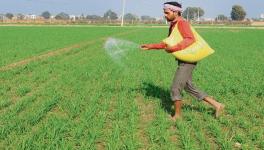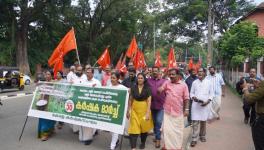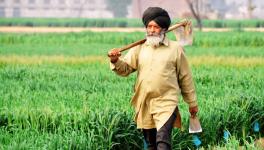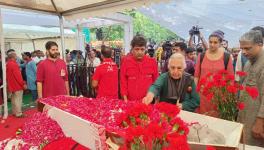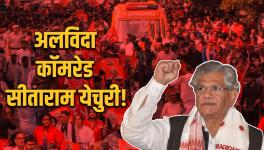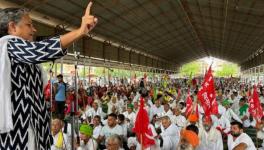Maharashtra: Tribal Farmers Struggling for Land Ownership Since Independence
"There is no electricity, road connectivity, or access to drinking water in our villages. There have been times when pits were dug for the electricity network, but forest officials stopped the work. We are forced to reply to lamps; Rainwater is our only water source for agriculture-related activities. On top of that, we face constant harassment from government officials," Nikita Nitin Kakda, a 30-year-old tribal farmer involved in Kisan Long March, told NewsClick.
Kakda participated in the Kisan Long March, which began on March 12, with a group of people from her village. The group constitutes around 10 women, including Kakda. Her words highlight the falseness behind the government's claims that every household has been provided with water and electricity. The ancestral land they cultivate or live on is marked as forest land in official papers.
The villagers allege that the government wants to remove them from the ancestral land they have used since before India's independence.
However, the Government of India has enacted the Scheduled Tribes and Other Traditional Forest Dwellers (Recognition of Forest Rights) Act, 2006 and commonly known as the Forest Rights Act (FRA), which has been brought to recognise forest rights and possession of forest land by forest-dwelling communities and individual residents. These people have lived in such forests for generations, but their rights have not been registered. The Act recognises their ancestral lands and habitats in forest areas.
The Act has not been implemented adequately, resulting in historical injustice to forest dwellers who are part of the forest ecosystem.
FRA guarantees that if the land on which the tribals live or cultivate is ten acres or less, they will have ownership rights. Still, it has not been appropriately implemented in the country.
A large number of tribal farmers live in Maharashtra. Communist Party of India (Marxist) [CPIM] and All India Kisan Sabha (AIKS) have been active among tribal farmers in raising issues related to their rights.
In 2018, under AIKS' leadership, around 50,000 farmers took out a Kisan Long March, marching on foot from Nashik to Mumbai. The government relented under pressure and agreed to give ownership rights to tribal farmers under FRA; however, the promise is yet to be fulfilled.
Due to these failed promises and the onion crisis in the state, tribal farmers, once again, started a march from Nashik to Mumbai on March 12. However, this time, the government sensed the movement's strength and agreed to all the demands made by the farmers.
On March 18, the farmers called off their march as the government promised to fulfil their demands and announced a committee. The committee included farmers' leader JP Gavit, and CPIM MLA Vinod Nikolay, among others.
The question of land ownership isn't solely a concern expressed by tribal farmers of Maharashtra. Recently, tribal farmers in Manipur saw their houses being bulldozed because they were accused of encroaching on forest land. A similar thing happened in Himachal Pradesh.
Lakhs of farmers made their claims under FRA, but half were rejected or are still pending. Per data till December 2022, more than 44 lakh tribal farmers claimed ownership rights, of which only 22 lakh claims were successful. The claims of over 17 lakh farmers have been rejected.
In Maharashtra, around 3,75,000 tribal farmers applied for land ownership under FRA. About 1,72,000 claims have been accepted, while approximately 45,000 have been rejected. The rest are pending.
Even the farmers who had successful claims say they received significantly less land than they had earlier.
Urmila Jeeva Gavit, a teacher joining farmers' struggles since childhood with her father, JP Gavit, says, "The government has not given land to most of the tribals. The few tribals given land have been given half an acre, one acre or even less land while cultivating three to five acres of forest land. According to FRA, up to ten acres of land can be given to farmers. But the government and its officials do not want to provide land to farmers."
She adds, "The forest officials destroy our standing crop. They start planting trees by digging pits there. We used to work on these lands for generations, but now the government is evicting us from our land by making a law."
Most tribal farmers said this about crop failure and told how the officers destroy the standing crops and misbehave with the tribals.
Ram Chandra Gangwad, a farmer from Nashik district, says, "Nobody sees the loss we face. We have been fighting for our rights on our land since before independence. Earlier, the British officers used to stop us from farming. We struggled with them, and now even after independence, we are continuously fighting for the ownership of our land."
John, who was a part of this long march from Palghar, says, "The government is not giving us land to do farming while many forests are being cut in the name of development. The government is giving land for bullet trains and highways, and their benefits are being given to big capitalists. We are not against development, but why are we being evicted from our land?"
Krishna Santu Bhanwar, a tribal farmer from Shapur and a local CPIM leader, says, "The FRA has not been appropriately implemented. Under this Act, projects like roads, schools and hospitals can be set up in the areas where tribals live, and the authorities cannot stop them. Still, on the contrary, the authorities are not allowing any work to be done in our villages; there is no road. After a lot of struggle, we started the road construction by donating labour, but the forest officials did not like it and stopped the work and sued us. More than five cases are against me, all related to forest area development work."
He explains, "When we tell them you are not supplying water, let us make a well, they say that a well should be made of clay. Have you seen a well made of clay? Similarly, We are not allowed to drive tractors in our fields and are told to do farming with oxen. You tell me, is all this possible today? That's why the struggle is the only way."
Tribal farmers from all over the country are facing similar pain and suffering; therefore, on April 5, farmers and labourers from all over the country are coming to Delhi under the leadership of AIKS. An adequate implementation of FRA is among their main demands.
Get the latest reports & analysis with people's perspective on Protests, movements & deep analytical videos, discussions of the current affairs in your Telegram app. Subscribe to NewsClick's Telegram channel & get Real-Time updates on stories, as they get published on our website.










